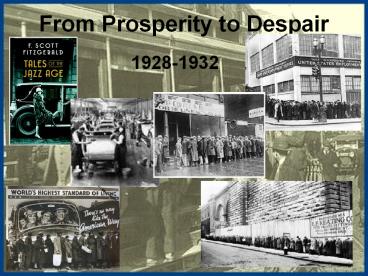From Prosperity to Despair PowerPoint PPT Presentation
Title: From Prosperity to Despair
1
From Prosperity to Despair
- 1928-1932
2
A. Election of 1928
1. Coolidges surprise- I do not choose to run
for President in 1928
3
3. Democrats choose Al Smith Qualifications
Big city Catholic, son of immigrants, Gov of NY
2. Republicans choose H. Hoover Qualifications
small town protestant, self made millionaire, Sec
of Commerce under Pres Coolidge, WWI Relief
Agency
Catholic issue used by Republicans against
him
4
4. Hoover wins big, reflecting belief that things
were fine
5
B. Get Rich Quick Fever
Rags to riches stories inspired speculation
in the stock market and in real estate
6
1. Land (real estate speculation) - nation wide,
but a particular boom occurred in Florida
People sometimes (unknowingly) bought swampland
sight-unseen. A big hurricane in 1926 ends the
land boom (temporarily)
7
2. Stocks
Only about 1.5 million people were involved in
buying stocks, but the market and its 1929 crash
had a big influence on the depression that
follows
Unrealistic stock prices in 1928 and 1929 and
too much buying on margin helped lead to Oct.
1929 crash
Buying on margin means paying only a portion
of the stocks total purchase price and
borrowing the rest from a stock broker or from
a bank (a high reward, but high risk, way to
invest
8
C. Signs of a Slow Down
1. Wages werent keeping up with the prices so
Buying and spending goes down
Eventually workers are laid off
Demand goes down
Production cut backs begin
This becomes an endless cycle
9
D. The Crash
1. Stocks
Prices rise steadily during the 1920s
- Prices skyrocket in 1928-29 despite signs of
economic slowdown
By Sept. 1929 prices were 400 higher than 5
years earlier and were now falsely representative
of many companies worth
10
Oct. 24th- Black Thursday- NYSE flooded with
orders to sell and with margin calls
Oct. 29th- Terrible Tuesday (also called
Black Tuesday) - orders to sell at any price, but
fewer takers as market crashes
11
E. Causes of the Depression
1. Too much supply - not enough demand
Mass production vs. wages not keeping up
12
2. Too many durable goods Examples
refrigerators, stoves, autos, etc.
By 1929 many either already had them or
couldnt afford them
13
3. Business inventories (goods on hand) too high
Causes production cuts/ lay offs/ less
purchasing power
14
4. Weakness of banking system
People, not trusting them, withdrew their money
From banks
Banks loaned to speculators who now couldnt
pay back loans
Bank Runs - people withdrew money from the
banks in a mass panic
Approx. 5,000 banks fail from 1929-1932
(140 failed in Great Recession of 2009)
15
5. European investors had their own economic
problems so they withdrew money also
16
F. Economic Collapse and its Impact
17
G. Hoovers Initial Hands Off Policy
1. Believed the depression was part of the normal
economic cycle - as was recovery
2. Tried to bolster confidence made a public
statement that The depression is over May 1930
18
3. Urged voluntary relief programs - examples
Salvation Army, YMCA, Community Chest, etc.
Also encouraged business leaders to stop
production cutbacks and layoffs
19
H. Hoovers Efforts
1. Spent government money on public works
projects - but only with money on hand
2. Reconstruction Finance Corp. (RFC)
Government agency designed to stop
bank/business closures (similar to recent bail
outs)
Ineffective because 1. Banks slow to loan out
money 2. Few Public Works projects were
funded
This program was based on the Trickle Down
theory of Economics but the way it operated
little help trickled down!
20
I. Bonus ArmyThe B.E.F. or Bonus Expeditionary
Force
- In 1931, Congress votes to let Vets borrow
against a promised bonus (for serving During WW1) - 2. Hoover vetoes the bill
21
3. Vets march from Oregon (and elsewhere across
the country) to Washington D.C. Hoover
refuses to meet with them
22
4. Many set up camp near the Potomac River on the
Anacostia Flats
23
5. After a violent scrap with local police,
General Douglas MacArthur ordered to use the
Regular Army to break up the B.E.F.s camp
6. Negative publicity hurts Hoover
24
J. Election of 1932
1. Republicans re-nominate Hoover despite his
growing unpopularity
25
2. Dems nominate Gov. of New York Franklin Delano
Roosevelt
3. Campaign - Hoover seemed pessimistic, while
FDR exuded optimism and pledged a New Deal for
the American people
26
4. FDR defeats Hoover in a huge landslide

